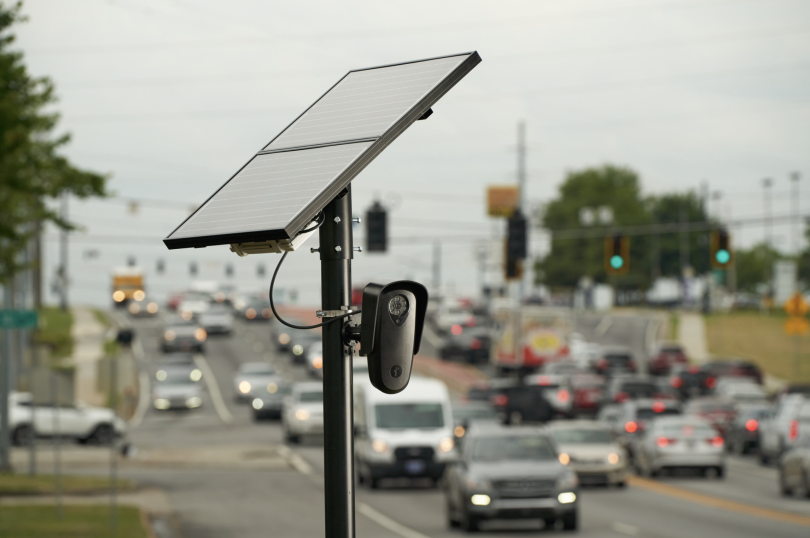
While living in a large city, it’s impossible to keep track of what every single person is up to at a given instant. Though countless individuals are simply going about their day-to-day lives, there are plenty of people who are simultaneously up to less lawful activities that threaten the safety of others in that community. In Cobb County, a half-hour drive from Atlanta, the overall crime rate is 32.9 per 1,000 residents in a year, according to CrimeGrade. This means that a crime is committed there about once every 21 minutes.
When sirens become part of the local white noise, it’s a long-overdue call to take action toward reducing crime in that area. For this task, which is easier said than done, Flock Safety offers a solution that works to eliminate crime and diminish the amount of crime that goes unsolved. As a matter of fact, the company has already reduced crime in Cobb County by 62 percent since its 2017 launch, according to the company, but its work doesn’t stop there. Flock Safety has a goal of reducing crime in the U.S. by 25 percent in three years, Aynn Collins, director of talent acquisition, told Built In.
As to how Flock Safety plans to accomplish this ambitious feat, its strategy hinges on its network of high-tech cameras capable of reading license plates. Over 70 percent of all crime is committed with a vehicle, as found by the company. By capturing clear images of license plates as well as defining vehicle characteristics like make, type, color and damage, Flock Safety aims to help neighborhoods and law enforcement agencies solve crime efficiently and without human bias.
The idea for Flock Safety sparked when a property crime was committed in CEO and co-founder Garrett Langley’s Atlanta neighborhood. After speaking with local law enforcement following the incident, he learned that about 80 percent of property theft crimes go unsolved, and he became curious as to how the criminals in these situations could be better identified. Alongside co-founder Matt Feury, they developed an affordable solution to provide private neighborhoods and law enforcement with license plate numbers that could help solve crimes.
“One of the things that’s super special about Flock is we’re disrupting an industry that has been relatively untouched for a while,” Collins said. “It’s a platform that helps people that have very hard jobs and really makes the community safer.”

It’s doing so with products like its Flock Safety Falcon camera — a solar-powered, motion-activated, machine learning-powered device that uses proprietary vehicle fingerprint technology to capture computer-readable license plate images. Its cameras can wake up and start snapping pictures within a tenth of a second of a vehicle passing by at up to 75 mph. The company doesn’t use facial recognition tech or capture images of nearby pedestrians. Its cloud-based software is connected through LTE communication to share data with law enforcement when a crime is committed and reported.
“There’s a huge theme of catalytic converter theft now in the U.S., so we’re able to solve a lot of that,” Collins said. “We’re finding that criminals seeing a Flock camera in the neighborhood makes them think otherwise about committing a crime in that neighborhood.”
Though overall crime in the U.S. dropped over the course of the pandemic, the same cannot be said for violent crimes such as shootings and homicides. Flock Safety has grown in response to a greater need for its solution. The company recently achieved unicorn status following its a16z-led Series D raise this past summer with plans to accelerate product development and build out its team. Flock has raised $230 million in total funding to date.
Its latest move was the installation of 22 cameras in the Atlanta Airport Community Improvement Districts. These cameras have already helped recover 20 stolen vehicles and locate two wanted suspects.
Up ahead, Flock is planning to expand its product suite. Its new addition will have more audio capabilities, compared to the company’s current still image capture tech. With cameras active in over 1,200 cities and partnerships across a majority of the country, Flock is planning to expand its footprint even further.
The company’s Atlanta-based team has grown from 50 employees to about 320 over the past 18 months, according to Collins, and is on track to grow even more. Flock plans to hire remote-first roles across sales and engineering. It’s planning to reach 350 people by the end of this year and hire at least 100 people next year, according to Collins.
“We’re looking for people to understand the interplay between software and hardware,” Collins said. “We’ve got to hire really smart people that know how to build more products that keep our community safer.”




